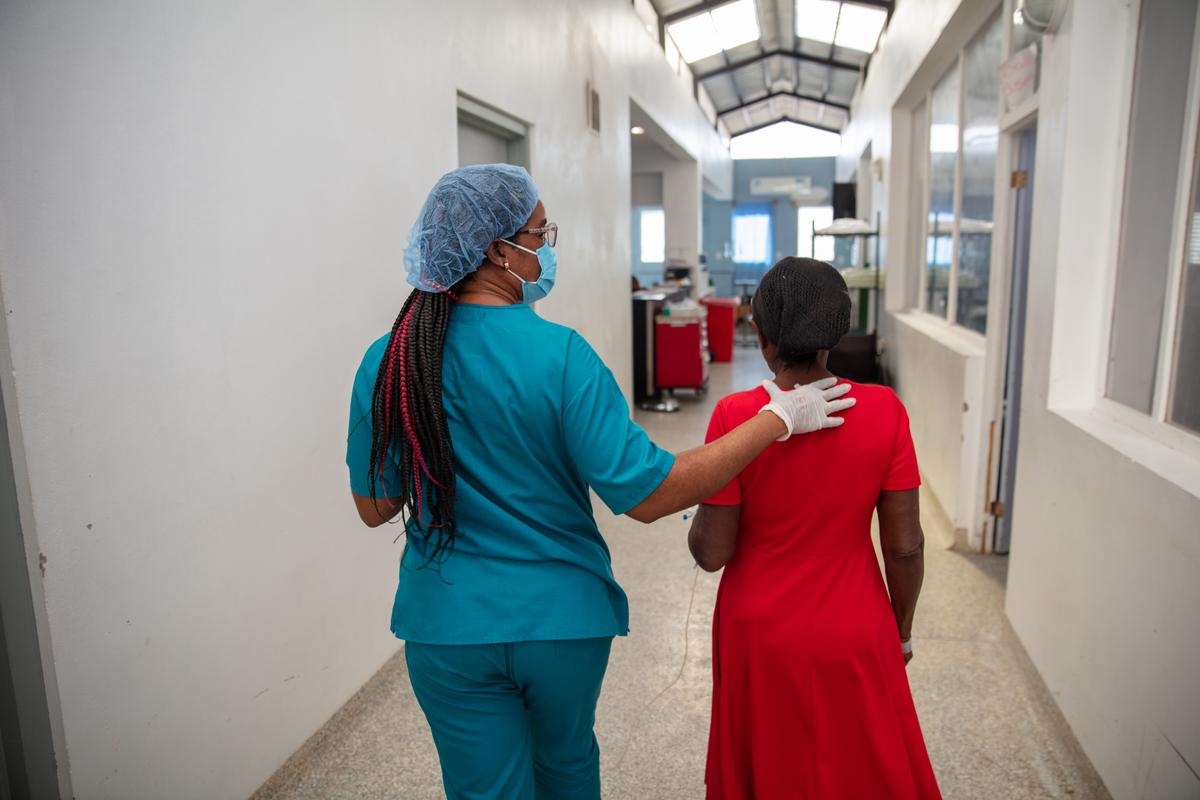As Crisis Continues in Haiti, ‘You Have to Live It to Understand It’
Dr. Ralph B. Charles, Zanmi Lasante regional director for the Lower-Artibonite district in Haiti, shares his experience caring for patients during widespread instability
Posted on Apr 1, 2024

As the violence and instability in Haiti worsens, the health system is being crushed. Hospitals around the country have been attacked and looted, health care workers have been forced to flee or hide for their safety, and basic drugs and supplies can’t reach facilities, much less the patients who need them.
At Zanmi Lasante, PIH's sister organization in Haiti, our teams are doing everything they can to continue providing care to those who need it most. This is an extraordinary feat as they face serious shortages of fuel, supplies, and critical medicines, due to rising costs and transportation challenges such as roadblocks.
“You have to live it to understand it,” said Dr. Ralph B. Charles, Zanmi Lasante’s regional director for the Lower-Artibonite district. “There’s this constant fear. Every day there’s a new obstacle, so you have to be ready to devise a new strategy. It’s an ongoing battle.”
A roadblock, which can include a pricey toll or the threat of violence, can create a cascade of problems: blocking food deliveries for our nutrition programs, preventing supplies and medicine from reaching our clinics, intimidating patients from freely and safely accessing health care, and restricting fuel to power our hospitals.
The consequences can be life-threatening—our clinical team at Hôpital Universitaire de Mirebalais (HUM) currently only has enough IV fluids to continue providing care for two days.
“There’s a saying in French, ‘à chaque jour suffit sa peine.’ It’s basically saying, ‘deal with everything one day at a time.’ That’s the only way we can do it,” Dr. Charles said. “If you keep thinking about the big picture of the situation all the time, it’s so overwhelming that your head might explode. You just have to focus on what you can deal with.”
So, one day at a time, Zanmi Lasante’s teams continue providing care. While many facilities around the country have closed their doors, ours have stayed open. But patients still fear traveling for care, weighing access to treatment against the threat of violence—a calculation no patient should have to make.
“It was already hard to access care and now it’s ten times harder. There are a lot of patients that don’t make it to the hospital or that make it too late,” Dr. Charles said. “Those that do make it, they do it at the risk of their own lives. I had a story of a pregnant patient who was going to the hospital to deliver and got shot in the leg at a barricade on the road. When she got here, we stabilized her, and she delivered immediately, even before we took care of the bullet wound.”
For the patients who are able to access care, limited resources—and the resulting surge in prices—are another obstacle they must face.
“Care that used to be provided for free has been limited because of the supplies we can’t get,” said Dr. Charles. “If a patient goes to a pharmacy for medication, and the pharmacy actually has the medication there, it’s going to cost the patient about five or six times what it used to, and sometimes way more depending on what they need.”
Dr. Charles, who earned his master's degree in Global Health Delivery at Harvard University and returned to Haiti in late 2022, has made an incredible commitment to his work and his colleagues at Zanmi Lasante, choosing to work alongside them, on the ground in the Lower-Artibonite district.
“I love the work I’m doing, and I can’t stand it to not be done well,” Dr. Charles shared. “And I think it motivates the staff because your staff sees that you are making sacrifices in your position, that you don’t have to. They feel more appreciated and supported.”
Being there for his team has also helped him understand how this crisis is directly impacting Zanmi Lasante facilities and has allowed him to strategize based on first-hand experience. For example, he was able to secure fuel for a month, because he noticed multiple tankers passing on a road that was supposed to be blocked. With the road clear, he was able to go out almost immediately and collect fuel, giving him peace of mind and time to plan for the next month’s supply.
The road was closed again the next day.
However, choosing to work alongside his Zanmi Lasante colleagues in Haiti has not been easy for him—or his family.
“The worst part is my daughter. Because she’s six, she doesn’t really get it,” he said. “Lately she’s been calling me and asking me when I'm gonna come back to visit because I usually travel every 45 days to be with her for a week or two, and how come I haven’t told her when I’m gonna come home yet because it's been more than 45 days since my last trip. This is when reality sinks in and makes me want to cry. And she doesn’t understand, she can’t understand.”
As the crisis in Haiti continues to escalate, Dr. Charles and the Zanmi Lansante team are doing everything they can to continue caring for our patients, accompanying them, standing by them in solidarity, and keeping them safe. Patients across Haiti are going to extraordinary lengths to reach our facilities—and we will be there for them, whatever it takes.
Support Our Work
Your generous donation today will immediately go towards supporting our dedicated staff in Haiti and the communities we serve.

